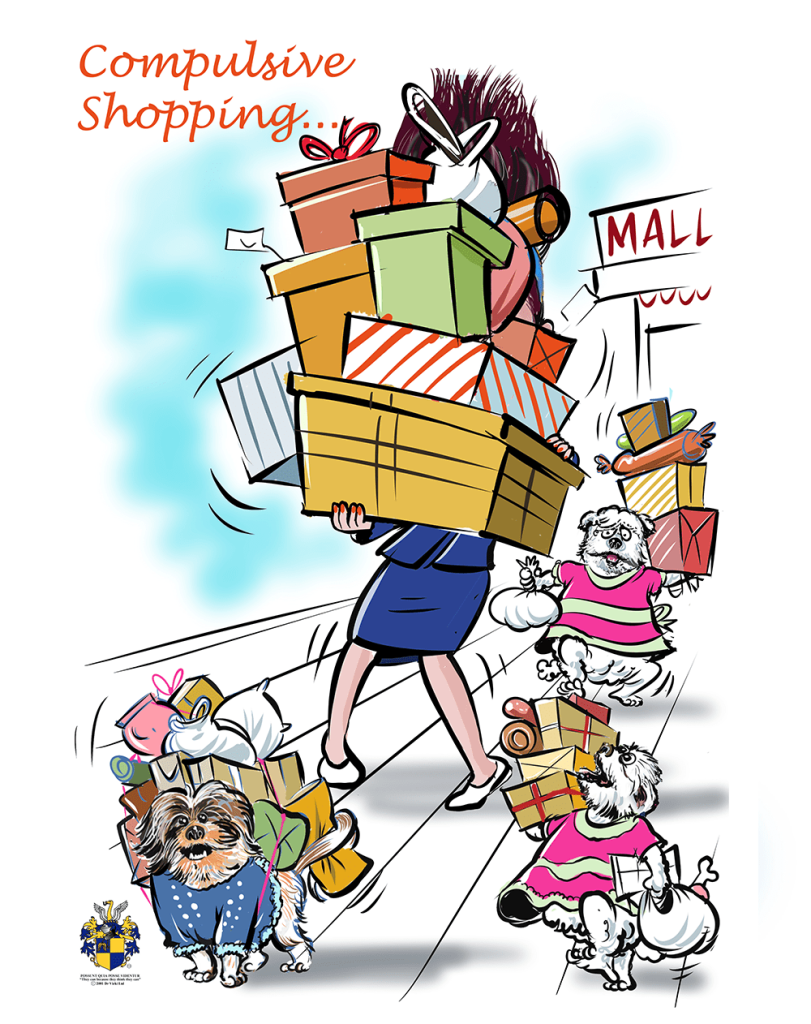Do you have a hard time resisting the urge to buy things? Do you find yourself shopping more than you intended to, or spending more money than you planned?
If so, you may be struggling with compulsive shopping. Compulsive shopping is a type of addiction in which a person feels the need to shop compulsively, often despite negative consequences.
This can lead to financial problems, ruined relationships, and even mental health issues. In this blog post, we will explore the concept of compulsive shopping, its effects on people’s lives, and some tips for coping with it. We will also hear from experts about their views on this disorder.
Contents
Understanding Compulsive Shopping
There is no single, clear definition of compulsive shopping. However, most experts agree that it refers to a pattern of excessive and uncontrollable buying that causes significant problems in a person’s life. Compulsive shoppers may feel the need to buy things they don’t need or can’t afford, and they often shop even when they know it will cause them harm.
Compulsive Shopping And Consumerism
This shopping is often associated with consumerism. Consumerism is the idea that buying things will make you happy and solve all of your problems. This ideology can be harmful because it can lead to such shopping and other spending problems.
Types of Compulsive Shopping
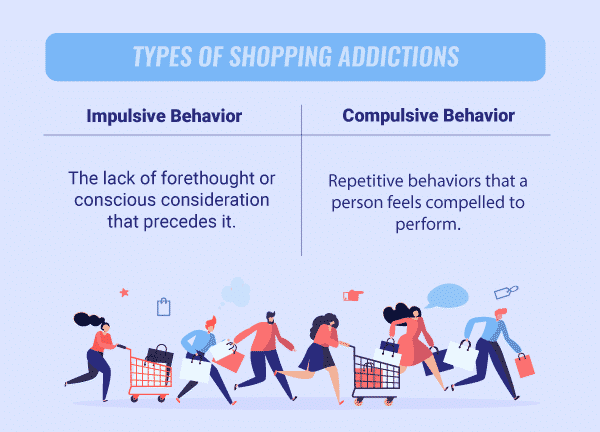
There are several different types of compulsive shopping, including:
Shopping for pleasure or thrill: This type of shopper buys things simply because they enjoy them and get a rush from buying new things. They may have a large number of items that they never use and may even have problems paying their bills because of their shopping habits.
Compulsive buying: This type of shopper buys things they don’t need in order to relieve anxiety or other negative emotions. They often feel overwhelmed by their debts and the amount of stuff they own.
Gambling with money: This type of shopper spends money on items they don’t need in order to get a thrill or make themselves feel better. Like gamblers, they may become addicted to the rush of buying things and can quickly rack up large debts.
Shopping for status: This type of shopper buys things in order to look wealthier or more popular than they are. They often have expensive tastes and may buy things they can’t afford.
Degrees of Compulsive Shopping
Not everyone who shops compulsively experiences the same problems. Some people may only engage in a few of the behaviors listed above, while others may struggle with all of them.
Experts typically divide compulsive shoppers into three categories: mild, moderate, and severe.
Mild: People in this category have a few of the symptoms of compulsive shopping, but they are not causing major problems in their lives.
Moderate: People in this category have moderate levels of symptoms and are experiencing some negative consequences as a result of their shopping habits.
Severe: People in this category have severe symptoms and are experiencing significant problems as a result of their compulsive shopping.
Signs you’re a shopaholic
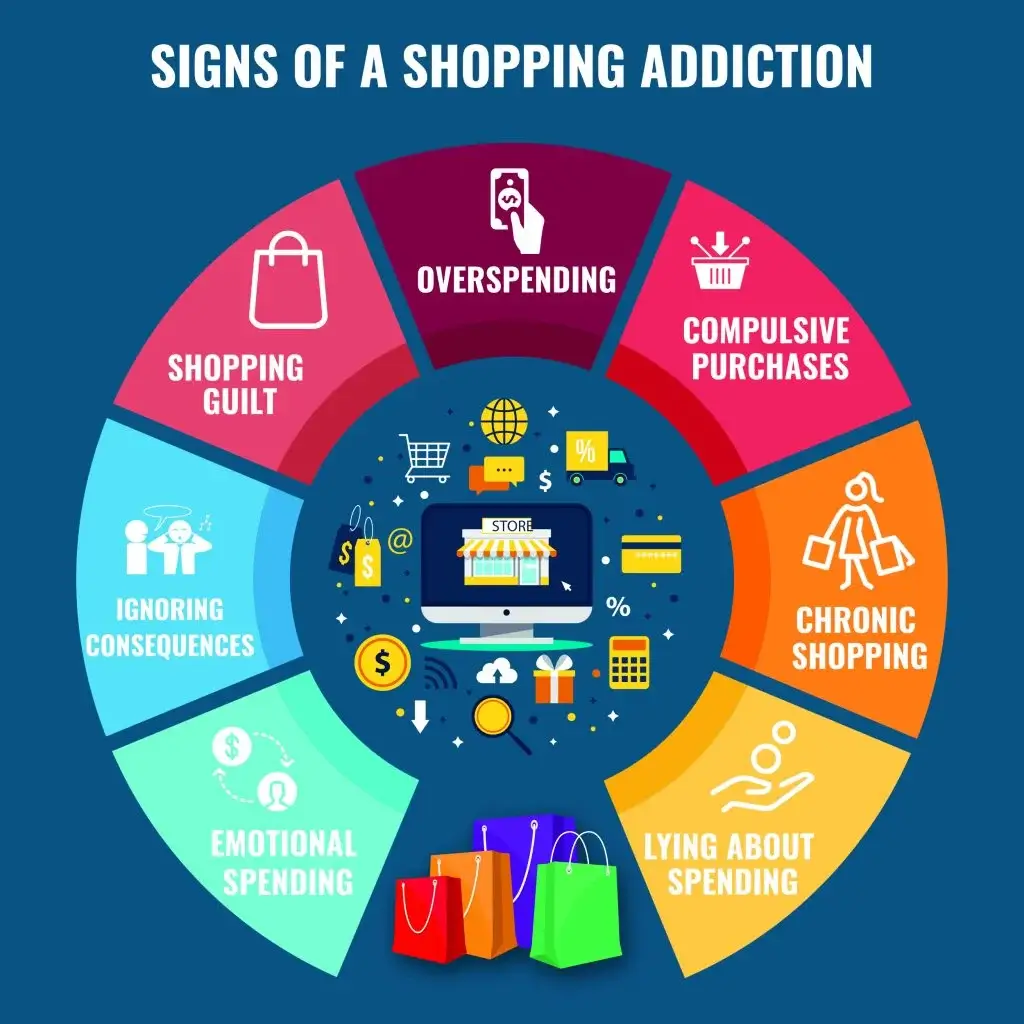
There is no one-size-fits-all answer to this question, as the signs of such shopping can vary from person to person. However, some common signs that someone may be struggling with compulsive shopping include:
Have trouble resisting the urge to shop: People with compulsive shopping issues often have a hard time resisting the urge to buy things, even if they know it will cause them harm.
Feel anxious or stressed when you’re not shopping: People with compulsive shopping issues may feel a sense of relief or happiness when they’re shopping, and they may feel anxious or stressed when they’re not.
Have trouble controlling your spending: People with compulsive shopping issues often have a hard time resisting the urge to buy things, even if they can’t afford them.
Spend more money than you can afford: People with compulsive shopping issues often spend more money than they can afford on things, which can lead to financial troubles.
Feel the need to buy things even when you don’t need them: People with compulsive shopping issues may feel the need to buy things even when they don’t need them, which can lead to unnecessary purchases.
Feel like you need to shop to be happy: People with compulsive shopping issues may come to rely on buying things as a way to make themselves happy.
Causes of Compulsive Shopping
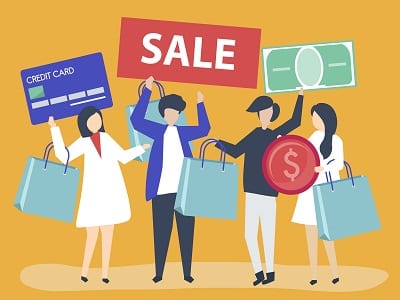
There is no one cause of compulsive shopping. However, experts believe that a variety of factors may contribute to it, including:
Psychological factors: People with compulsive shopping issues may be more likely to experience negative emotions such as anxiety or depression. They may use buying as a way to cope with these feelings.
Emotional factors: People with compulsive shopping issues may be more likely to experience emotions such as happiness, excitement, or relief when they’re shopping.
Environmental factors: People with compulsive shopping issues may be more likely to be exposed to marketing and advertising that encourages excessive spending. They may also have easy access to stores and credit.
Biological factors: Some experts believe that there may be a genetic component to compulsive shopping, as it tends to run in families.
Social factors: People may be more likely to develop compulsive shopping issues if they are constantly exposed to images of luxury or wealth.
Family history: There is some evidence that people may be more likely to develop compulsive shopping issues if they have a family history of it.
People At Risk of Compulsive Shopping
Not everyone who experiences some of the symptoms of such shopping will go on to develop a full-blown disorder. However, there are certain groups of people who may be more at risk for developing it.
People with a history of:
Mental health disorders: People with a history of mental health disorders may be more likely to develop compulsive shopping issues.
Addiction: People who have struggled with addictions in the past are more at risk for developing compulsive shopping issues.
People who are:
Under stress: People who are under stress may be more likely to develop compulsive shopping issues.
Impulsive: People who are impulsive may be more likely to develop compulsive shopping issues.
Women: Women are more likely than men to experience problems with compulsive shopping.
Evaluating Compulsive Shopping
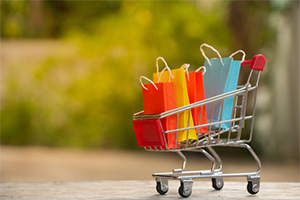
In addition to this shopping issue, there are a few other conditions that may be related to it. These include:
Compulsive buying: People with compulsive buying issues may feel the need to buy things even when they don’t need them. This can lead to unnecessary purchases and financial troubles.
Compulsive gambling: People who are addicted to gambling may also be addicted to buying things. This is because gambling and buying can both activate the same pleasure centers in the brain.
Shopping addiction: People with shopping addiction issues may have a hard time resisting the urge to buy things, even if they can’t afford them. They may also experience negative consequences as a result of their shopping, such as financial troubles.
Harmful Effects Of Compulsive Shopping
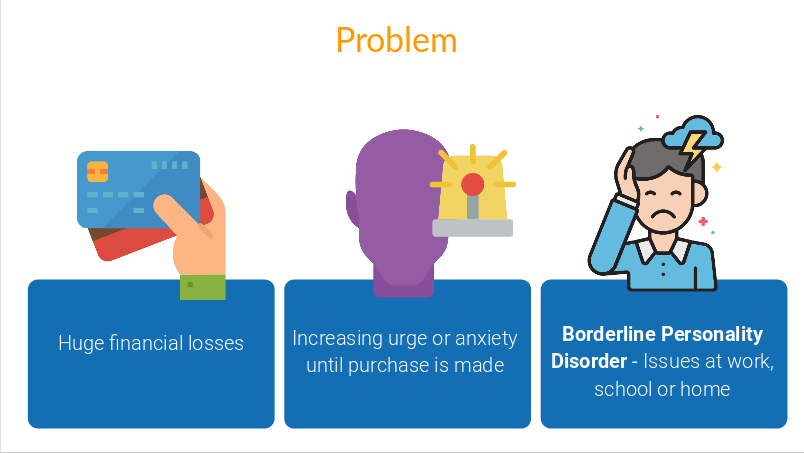
The harmful effects of such shopping sprees can be felt in various areas of life, such as:
Financial problems: People with these shopping issues often spend more money than they can afford on things, which can lead to financial troubles. Many people with compulsive shopping issues end up in debt because of their spending habits. This can cause a lot of stress and anxiety.
Relationship problems: Compulsive shoppers may also have trouble maintaining healthy relationships due to their spending. They may be more likely to argue with loved ones about money and buy things instead of investing in relationships.
Health problems: People with these shopping issues may also have health problems as a result of their spending. They may be more likely to buy unhealthy foods or spend money on unnecessary medical treatments.
Social problems: Compulsive shoppers may also have social problems as a result of their spending. They may be more likely to be isolated from friends and family, and they may find it hard to make new friends.
Compulsive Shopping And Mental Health
People with these shopping issues often have other mental health disorders as well. This is because the two conditions are related to each other. Some of the most common mental health disorders that co-occur with this shopping include:
Depression: People with depression may be more likely to develop compulsive shopping issues.
Anxiety: People with anxiety disorders may be more likely to develop compulsive shopping issues.
Bipolar disorder: People with bipolar disorder may also have issues with compulsive shopping.
Obsessive-compulsive disorder (OCD): People with OCD often have intrusive thoughts about buying things. This can lead to compulsively shopping in an effort to get rid of the thoughts.
Binge eating disorder: People with binge eating disorder often have issues with compulsive shopping. They may use buying as a way to cope with feelings of guilt or shame about their eating.
Bulimia nervosa: People with bulimia nervosa may also have issues with compulsive shopping. They often use buying as a way to compensate for the binge eating they do.
Coping With Compulsive Shopping
If you think you may have a problem with this condition, there are several steps you can take to evaluate it.
Look at your spending patterns: One of the best ways to evaluate whether or not you have a problem with compulsive shopping is to look at your spending patterns. Ask yourself how much money you typically spend on things that you don’t need, how often you feel the urge to buy things, and whether or not buying makes you happy.
Check-in with your emotions: Another way to evaluate whether or not you have a problem with compulsive shopping is to check in with your emotions. Ask yourself how you feel when you’re not shopping, whether or not buying makes you feel better, and if you’re able to resist buying things.
Talk to a professional: If you’re still unsure whether or not you have a problem with this condition, it’s helpful to talk to a professional about it. A therapist can help you evaluate your symptoms and determine if treatment is necessary.
Self-help Tips
If you think you may have a problem with this condition, there are a few things you can do to help yourself.
Step back and take a look at your spending habits: One of the best ways to start dealing with any addiction is to be aware of it. Spend some time tracking your spending for a week and see where your money is going.
Create a budget: Once you have an idea of how much money you’re spending on unnecessary things, create a budget for yourself. This will help you keep track of your spending and make sure that you’re not overspending.
Think about the consequences of your buying: When you’re tempted to buy something, think about the consequences of doing so. Will buying this thing make you happy? Or will it just be a temporary fix?
Talk to someone: If you’re struggling with compulsive shopping, talking to someone can be really helpful. Talk to a friend, family member, therapist, or any other support system.
Talking To a Professional
If you think you have a problem with compulsive shopping, talking to a professional is the best step to take. A therapist can help you evaluate your symptoms and determine if treatment is necessary.
Therapies
If you have a problem with this condition, there are several therapies that can help.
Cognitive-behavioral therapy (CBT): CBT is often used to treat OCD. It focuses on changing the thoughts and behaviors that are associated with the disorder.
Dialectical behavior therapy (DBT): DBT is often used to treat borderline personality disorder, but it can also be helpful for people with compulsive shopping issues. It focuses on helping people learn how to regulate their emotions and tolerate distress.
Medication: Some people with compulsive shopping issues may benefit from medication. There are a few medications that have been shown to be helpful in treating OCD, such as serotonin reuptake inhibitors (SRIs) and selective serotonin reuptake inhibitors (SSRIs).
Experts’ View On Compulsive Shopping
There are still many researchers who don’t know about compulsive buying and how it should be treated.
“Compulsive buying is a behavior that, although not yet classified as an addiction, appears to share some clinical features with addictions,” said Dr. David Tolin, director of the Anxiety Disorders Center at The Institute of Living in Hartford, Conn., and author of “Buried in Treasures: Help for Compulsive Acquiring, Saving, and Hoarding.”
“The key difference is that people with addictions feel a compulsion to use the substance or engage in the behavior even though it has negative consequences in their life,” Tolin said. “People with compulsive buying tend to be aware of the negative consequences of their buying, but they are unable to resist the compulsion.”
Brain Activity During Compulsive Shopping
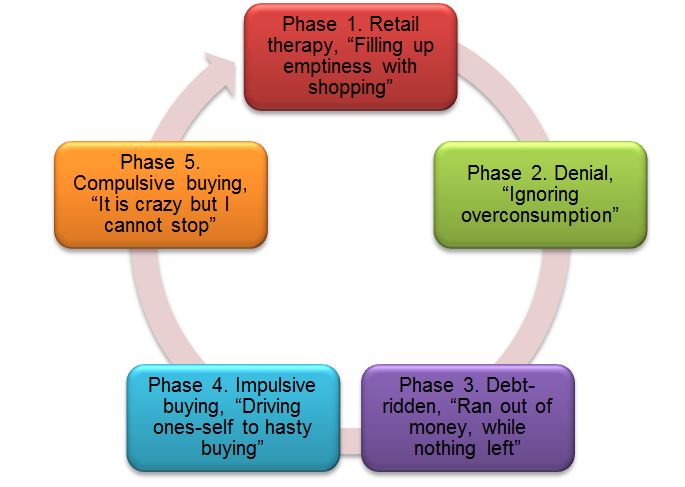
Studies have shown that there is increased activity in the brain when people are engaging in compulsive shopping.
One study found that there was increased activity in the nucleus accumbens, the part of the brain associated with pleasure and rewards when people were looking at pictures of things they wanted to buy.
Another study found that there was increased activity in the ventromedial prefrontal cortex, the part of the brain associated with decision-making and judgment when people were thinking about shopping items they had previously decided not to buy.
Case Study
One woman who was struggling with compulsive shopping issues decided to seek help from a therapist.
The therapist asked her to keep a journal of her thoughts and feelings before, during, and after she shopped.
The woman found that she was most likely to shop when she was feeling anxious or stressed. She would buy things in an attempt to make herself feel better.
The therapist helped the woman learn how to deal with her feelings in a different way, and she was eventually able to stop shopping compulsively.
Conclusion
Compulsive shopping can be a difficult issue to overcome, but it is possible. If you are struggling with this problem, seek help from a professional. There are several therapies that can help, and there is also medication available if needed. You can also talk to friends or family members for support.
Remember, you are not alone in this. Many people struggle with compulsive shopping and can relate to what you are going through. Don’t be ashamed to ask for help. You can get through this.
A Word From Therapy Mantra
Your mental health — Your psychological, emotional, and social well-being — has an impact on every aspect of your life. Positive mental health essentially allows you to effectively deal with life’s everyday challenges.
At TherapyMantra, we have a team of therapists who provide affordable online therapy to assist you with issues such as depression, anxiety, stress, workplace Issues, addiction, relationship, OCD, LGBTQ, and PTSD. You can book a free therapy or download our free Android or iOS app.
